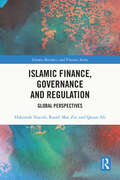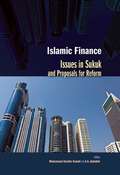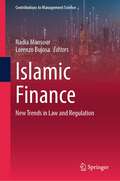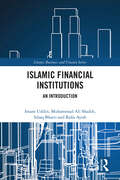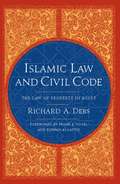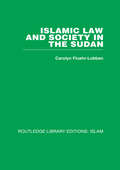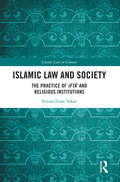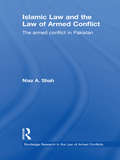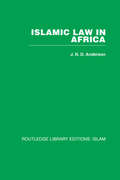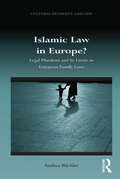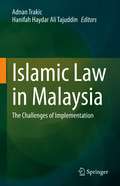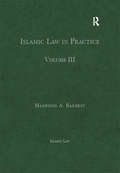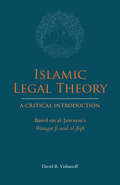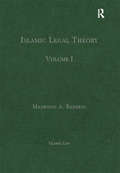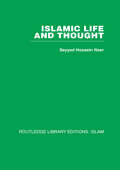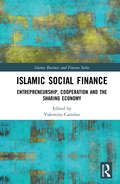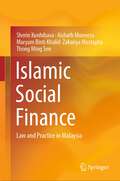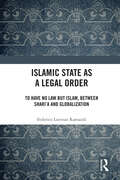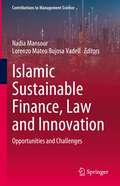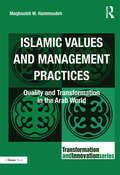- Table View
- List View
Islamic Finance, Governance and Regulation: Global Perspectives (Islamic Business and Finance Series)
by Hakimah Yaacob Razali Mat Zin Qaisar AliIslamic financial institutions (IFIs) are often criticized due to insufficient regulatory provision, thus lowering clients’ confidence in them. Additionally, few countries have well-established legislation relating to the Islamic finance industry, while others are only now developing preliminary regulations to incorporate Islamic finance within their own financial systems. This book offers a comprehensive understanding of Islamic financial regulation, outlining the regulatory landscape in various jurisdictions, examining how it supports the development and foundation of IFIs and addressing the regulation and supervision of IFIs from a global perspective. The book begins by introducing Islamic finance and its current position in the international banking system, then goes on to review the historical developments of the field. It discusses the key financial regulators, their functions, and the regulations that have been implemented to foster the growth of Islamic finance. It includes cases from both Eastern and Western countries. It thoroughly examines how Shariah principles are integrated into the regulatory framework of Islamic finance. Specifically, the book examines the laws and arrangements established in different countries regarding the governance of the Islamic finance industry as well as the legal criteria for setting up and governing IFIs. The focus is on exploring diverging laws and their impact on developing Islamic Finance. This will serve as an academic and practitioner guide to understanding the preliminary regulations required for the establishment, governance, and management of IFIs. Also, it offers practical insights and guidance for professionals working in the Islamic finance industry, including bankers, lawyers, regulators, and policymakers.
Islamic Finance: Issues in Sukuk and Proposals for Reform
by Mohammad Hashim Kamali A. K. AbdullahThis collection of essays brings together leading scholars and practitioners to discuss contemporary issues in the rapidly expanding sukuk market, and frankly debates the challenges facing it since the 2008 financial crisis.Highly recommended for practitioners, scholars, and students of Islamic finance.Professor Mohammad Hashim Kamali is the founding chairman and CEO of the International Institute of Advanced Islamic Studies (IAIS) in Malaysia, and is a leading authority in Islamic jurisprudence, Islamic finance, and human rights in Islamic law.A.K. Abdullah is an assistant research fellow at the IAIS.
Islamic Finance: New Trends in Law and Regulation (Contributions to Management Science)
by Nadia Mansour Lorenzo BujosaThis volume discusses the new trends in law and regulation in Islamic finance. Islamic finance is a particular component of the global financial system and is very different from secular finance. To understand the development of Islamic finance, it is important to place it in the context of financial globalization. Islamic finance is a new force in the contemporary world financial system and is present in more than a hundred countries. The current generation of Muslim economic power is crowding into the world's financial currents with trillions in liquidity and is growing at a high rate of 10-15% per year. Islamic finance is coming into focus and is not confined to Islamic countries but is present in every larger Muslim community, which means that it cannot be isolated from the effects of financial globalization. This edited volume discusses the effects of global financial transactions in Islamic finance and how it impacts its law and regulation.
Islamic Financial Contracts: A Research Companion (Islamic Business and Finance Series)
by Hussain Mohi-ud-Din Qadri Nasir IqbalIslam encourages business and financial transactions as a way of securing the basic needs for all human beings, but these need to be conducted in accordance with the principles contained in the Qur’ān and Sunnah. However, these legal concepts are not classified subject-wise, and the verses on commercial law, like all other topics, are scattered throughout the Qur’ān, making it difficult for readers to gain a full understanding of the topic. This, therefore, is the first comprehensive book to demystify Islamic Contract Law and specifically Islamic Financial Contracts, and to examine its roots and history. The book is written in a clear style to allow for a greater understanding of the more challenging and misunderstood areas pertaining to Islamic business and financial contracts. It also contributes a series of chapters which address the market niche and need, concerning Shariah compliance for Islamic financial products and services. The book is divided into 16 chapters in order to provide a holistic and thorough overview of Islamic law of contract. It covers the objections and misconceptions surrounding Islamic business and financial contracts. It also includes the key features and guiding principles of Islamic law of contract and offers technical know-how, illustrating the concept of formation of a contract, as well as the essential elements of a valid contract. The authors also offer a discussion on the system of options under Islamic business and financial contracts and potential solutions to breach of contracts. The book will serve as a handy reference for scholars and students of Islamic business and finance and Islamic commercial law and will also be beneficial for practitioners as well as legal and judicial officers. It will open new doors for further research in the field of Islamic Financial Contracts.
Islamic Financial Institutions: An Introduction (Islamic Business and Finance Series)
by M. Ishaq Bhatti Imam Uddin Muhammad Ali Shaikh Rafia AyubThis book provides a comprehensive overview of Islamic Financial Institutions, exploring current issues, including governance, Shariah compliance frameworks and regulatory aspects, as well as the principles involved in product structuring.It offers a basic understanding of Islamic financial instruments and their implementation in different regions. The book begins by introducing the Islamic financial system, its objectives, the financial intermediation process, the philosophy and methods of mobilization and utilization of funds followed by an overall comparison with the conventional financial system. It offers a definition and explanation of types of riba, sources of prohibition, the difference between riba and profit, types of transactions which involve interest and the adverse effects of interest on the economy. It covers a detailed study of Islamic financial contracts and discusses trade-based financing products, illustrating the structural and legal differences between conventional and trade-based financing products. Further, the book outlines the criteria for the determination of Shariah compliant status of equity securities, and the role and functions of capital markets in an Islamic framework. Finally, it goes on to present an overall model of an Islamic bank in comparison with a conventional bank, examining its methodology and procedures for ensuring shariah compliance, governance and regulation, keeping in view the operating strategies, risk management issues, liquidity requirements and so on.The book will be used by researchers, students and scholars of Islamic Banking and Finance and will also serve as a practical guide for bankers and finance professionals who wish to enhance their knowledge in the field, as well as those embarking on professional training or certification programs.
Islamic Law and Civil Code: The Law of Property in Egypt
by Richard DebsRichard A. Debs analyzes the classical Islamic law of property based on the Shari'ah, traces its historic development in Egypt, and describes its integration as a source of law within the modern format of a civil code. He focuses specifically on Egypt, a country in the Islamic world that drew upon its society's own vigorous legal system as it formed its modern laws. He also touches on issues that are common to all such societies that have adopted, either by choice or by necessity, Western legal systems.Egypt's unique synthesis of Western and traditional elements is the outcome of an effort to respond to national goals and requirements. Its traditional law, the Shari'ah, is the fundamental law of all Islamic societies, and Debs's analysis of Egypt's experience demonstrates how Islamic jurisprudence can be sophisticated, coherent, rational, and effective, developed over centuries to serve the needs of societies that flourished under the rule of law.
Islamic Law and International Commercial Arbitration (Islamic Law in Context)
by Maria BhattiThis book examines the intersection between contemporary International Commercial Arbitration and Shariʿa law in order to determine possible tensions that may arise between the two systems. It develops evidentiary and procedural rules under Shariʿa, as well as examining the consequences of stipulating qualifications of arbitrators based on gender and/or religion. The author extensively analyses the prohibition against interest (riba) and uncertainty (gharar) under Shariʿa and its impact on arbitration agreements, arbitral awards and public policy. The book also explores the prohibition against riba in light of international conventions, such as the United Nations Convention on Contracts for the International Sale of Goods. Case studies in the book include the Asian International Arbitration Centre, formerly the Kuala Lumpur Regional Centre for Arbitration, and the International Islamic Centre for Reconciliation and Arbitration, as well as the ‘Shari’a Standards’ developed by the Accounting and Auditing Organization for Islamic Financial Institutions. The book will be a valuable resource for academics, students and practitioners working in the areas of Islamic law and the Islamic finance industry.
Islamic Law and Society in the Sudan
by Carolyn Fluehr-LobbanFew studies exist which deal with Islamic law in practice, and this is among the first such studies in the English language for Islamic Africa. It is significant that the present study was completed just prior to the extension of Islamic law as the sole governing law in the Sudan in 1983, for it captures many essentials of the Shari’a as it has been applied for decades prior to this important change. Numerous movements for reform and change are discussed in the book, which reflect the contemporary debate in the Sudan over the position of Shari’a in society.
Islamic Law and Society: The Practice Of Iftā’ And Religious Institutions (Islamic Law in Context)
by Emine Enise YakarThis book places context at the core of the Islamic mechanism of iftā’ to better understand the process of issuing fatwās in Muslim and non-Muslim countries, thus highlighting the connection between context and contemporaneity, on one hand, and the adaptable perception of Islamic law, on the other. The practice of iftā’ is one of the most important mechanisms of Islamic law that keeps Islamic thought about ethical and legal issues in harmony with the demands, exigencies and developments of time. This book builds upon the existing body of work related to the practice of iftā’, but takes the discussion beyond the current debates with the intent of unveiling the interaction between Islamic legal methodologies and different environmental contexts. The book specifically addresses the three institutions (Saudi Arabia’s Dār al-Iftā’, Turkey’s Diyanet and America’s FCNA) and their Islamic legal opinions (fatwās) in a comparative framework. This demonstrates the existence of complex and diverse ideas around similar issues within contemporary Islamic legal opinions that is further complicated by the influence of international, social, political, cultural and ideological contexts. The book thus unveils a more complicated range of interactive constituents in the process of the practice of iftā’ and its outputs, fatwās. The work will be of interest to academics and researchers working in the areas of Islamic law, Middle Eastern studies, religion and politics.
Islamic Law and the Law of Armed Conflict: The Conflict in Pakistan (Routledge Research in the Law of Armed Conflict)
by Niaz A ShahIslamic Law and the Law of Armed Conflict: The Conflict in Pakistan demonstrates how international law can be applied in Muslim states in a way that is compatible with Islamic law. Within this broader framework of compatible application, Niaz A. Shah argues that the Islamic law of qital (i.e. armed conflict) and the law of armed conflict are compatible with each other and that the former can complement the latter at national and regional levels. Shah identifies grey areas in the Islamic law of qital and argues for their expansion and clarification. Shah also calls for new rules to be developed to cover what he calls the blind spots in the Islamic law of qital. He shows how Islamic law and the law of armed conflict could contribute to each other in certain areas, such as, the law of occupation; air and naval warfare; and the use of modern weaponry. Such a contribution is neither prohibited by Islamic law nor by international law. Shah applies the Islamic law of qital and the law of armed conflict to a live armed conflict in Pakistan and argues that all parties, the Taliban, the security forces of Pakistan and the American CIA, have violated one or more of the applicable laws. He maintains that whilst militancy is a genuine problem, fighting militants does not allow or condone violation of the law. Islamic Law and the Law of Armed Conflict will be of interest to students and scholars of international law, Islamic law, international relations, security studies and south-east Asian studies.
Islamic Law in Africa
by J N AndersonIn many parts of Africa three different systems of laws are concurrently applied – the imported "Colonial" law, the indigenous customary law and Islamic law. In some countries the customary and the Islamic law are kept separate and distinct, while in others they are fused into a single system. This volume represents a unique survey of the extent to which Islamic law is in fact applied in those parts of East and West Africa which were at one time under British administration. It examines the relevant legislation and case law, much of which has never appeared in any Law Reports; the judges and courts which apply it and the problems to which its application give rise.
Islamic Law in Europe?: Legal Pluralism and its Limits in European Family Laws
by Andrea BüchlerCultural and religious identity and family law are inter-related in a number of ways and raise various complex issues. European legal systems have taken various approaches to meeting these challenges. This book examines this complexity and indicates areas in which conflicts may arise by analysing examples from legislation and court decisions in Germany, Switzerland, France, England and Spain. It includes questions of private international law, comments on the various degrees of consideration accorded to cultural identity within substantive family law, and remarks on models of legal pluralism and the dangers that go along with them. It concludes with an evaluation of approaches which are process-based rather than institution-based. The book will be of interest to legal professionals, family law students and scholars concerned with legal pluralism.
Islamic Law in Malaysia: The Challenges of Implementation
by Adnan Trakic Hanifah Haydar Ali TajuddinThis book examines the challenges of the implementation of Islamic law in Malaysia. Malaysia is a pertinent jurisdiction to explore such challenges given its global focus, colonial history and institutions, and the intersection of the Shari’ah and secularism/multiculturalism. The resultant implementation challenges are underpinned by three factors that make Malaysia an important jurisdiction for those interested in understanding the place of Islamic law in the global context. First, Malaysia is often considered as a model Islamic country. Islamic law is a source of law in Malaysia. The Islamic law legal system in Malaysia operates in parallel with a common law legal system. The two systems of law generally are in harmony with one another. Nevertheless, occasional cross-jurisdictional issues do arise, and when they do, the Malaysian judiciary has been quite efficient in solving them. The Malaysian experience in maintaining such harmony between the two legal systems provides lessons for a number of countries facing such challenges. Second, Malaysia has a developed Shari’ah court system that interprets and applies Islamic law predominantly based on the Shafi’i school of thought. While, for the most part, the approach has been successful, there have been times when the implementation of the law has raised concerns as to the compatibility of Islamic law with modern principles of human rights and common law-based values. Third, there have been cases where Islamic law implementation in Malaysia has gained global attention due to the potential for wider international implications. To do justice to this complex area, the book calls on scholars and practitioners who have the necessary expertise in Islamic law and its implementation. As such, this book provides lessons and direction for other countries that operate a dual system of secular and Islamic laws.
Islamic Law in Practice: Volume III (Islamic Law)
by Mashood A. BaderinIslamic law influences the lives of Muslims today as aspects of the law are applied as part of State law in different forms in many areas of the world. This volume provides a much needed collection of articles that explore the complexities involved in the application of Islamic law within the contemporary legal systems of different countries today, with particular reference to Saudi Arabia, Morocco, Indonesia, Nigeria, Turkey, Malaysia and Pakistan. The articles identify the relevant areas of difficulties and also propose possible ways of realising a more effective and equitable application of Islamic law in the contemporary world. The volume features an introductory overview of the subject as well as a comprehensive bibliography to aid further research.
Islamic Law, Gender, and Social Change in Post-Abolition Zanzibar
by Elke E. StockreiterAfter the abolition of slavery in 1897, Islamic courts in Zanzibar (East Africa) became central institutions where former slaves negotiated socioeconomic participation. By using difficult-to-read Islamic court records in Arabic, Elke E. Stockreiter reassesses the workings of these courts as well as gender and social relations in Zanzibar Town during British colonial rule (1890-1963). She shows how Muslim judges maintained their autonomy within the sphere of family law and describes how they helped advance the rights of women, ex-slaves, and other marginalised groups. As was common in other parts of the Muslim world, women usually had to buy their divorce. Thus, Muslim judges played important roles as litigants negotiated moving up the social hierarchy, with ethnicisation increasingly influencing all actors. Drawing on these previously unexplored sources, this study investigates how Muslim judges both mediated and generated discourses of inclusion and exclusion based on social status rather than gender.
Islamic Legal Theory: Based on al-Juwayni's Waraqat fi usul al-fiqh
by David R. VishanoffDavid Vishanoff&’s thorough and original unpacking of the Sunnī jurist al-Juwaynī&’s (1028–1085) Kitāb al-Waraqāt fī uṣūl al-fiqh introduces English-speaking readers to the main concepts, terms, principles, and functions of the classical Islamic discipline of legal theory. This volume offers an ideal entry to the otherwise dense and complex mainstream Sunnī views that dominated Islamic legal thought in al-Juwaynī&’s day—and that are still widely accepted today. A critical edition of al-Juwaynī&’s Arabic text is also included.
Islamic Legal Theory: Volume I (Islamic Law)
by Mashood A. BaderinIslamic legal theory (usÅ«l al-fiqh) is literally regarded as ’the roots of the law’ whilst Islamic jurists consider it to be the basis of Islamic jurisprudence and thus an essential aspect of Islamic law. This volume addresses the sources, methods and principles of Islamic law leading to an appreciation of the skills of independent juristic and legal reasoning necessary for deriving specific rulings from the established sources of the law. The articles engage critically with relevant traditional views to enable a diagnostic understanding of the different issues, covering both SunnÄ« and ShÄ«’Ä« perspectives on some of the issues for comparison. The volume features an introductory overview of the subject as well as a comprehensive bibliography to aid further research. Islamic legal theory is a complex subject which challenges the ingenuity of any expert and therefore special care has been taken to select articles for their clarity as well as their quality, variety and critique to ensure an in-depth, engaging and easy understanding of what is normally a highly theoretical subject.
Islamic Life and Thought
by Seyyed Hossein NasrThis collection of essays by one of the best known contemporary Muslim scholars writing in English covers many facets of Islamic life and thought. The author has brought together studies dealing with the practical as well as intellectual aspects of Islam in both their historical and contemporary reality. The contemporary significance of themes such as religion and secularism, the meaning of freedom, and the tradition of Islamic science and philosophy is given particular attention.
Islamic Medical Ethics In The Twentieth Century
by C. A. O. van NieuwenhuijzeConsiders prominent issues in medical ethics in the 20th century, such as abortion, artificial insemination, organ transplantation, euthanasia as discussed by Muslim religious scholars, physicians and jurists. Despite the semi-equal spread of medical knowledge among the peoples of the world and the shared dilemmas brought about by modern medicine, Muslims tend to follow their own medical ethics, which agree ultimately with the basic requirements of Islamic religion and law.
Islamic Social Finance: Entrepreneurship, Cooperation and the Sharing Economy (Islamic Business and Finance Series)
by Valentino CattelanThe current dynamics of world economy show remarkable changes in the socio-economics of credit provision and entrepreneurship. If the emergence of the sharing economy is fostering innovative models of collaborative agency, networking and venture business, economic actors are also looking for a more sustainable development, able to foster profitability as well as community welfare. This book investigates Islamic social finance as a paramount example of this economy under change, where the balance between economic efficiency and social impact is contributing to the transformation of the market from an exchange- to a community-oriented institution. The collected essays analyse the social dimension of entrepreneurship from an Islamic perspective, highlighting the extent to which the rationales of "sharing," distribution and cooperation, affect the conceptualization of the market in Islam as a place of "shared prosperity." Moving from the conceptual "roots" of this paradigm to its operative "branches," the contributing authors also connect the most recent trends in the financial market to Shari‘ah-based strategies for community welfare, hence exploring the applications of Islamic social finance from the sharing economy, FinTech and crowdfunding to microcredit, waqf, zakat, sukuk and green investments. An illuminating reference for researchers, practitioners and policy-makers dealing with the challenges of a global market where not only is diversity being perceived as a value to be fostered, but also as an important opportunity for a more inclusive economy for everybody.
Islamic Social Finance: Law and Practice in Malaysia
by Aishath Muneeza Sherin Kunhibava Maryam Binti Khalid Zakariya Mustapha Thong Ming SenThis book addresses the growing significance of Islamic social finance as an alternative and sustainable financing approach in the world. With a focus on Malaysia, a global leader in Islamic banking and finance, the topics covered fills the gap in the extant research by providing in-depth coverage of the legal framework surrounding Islamic social finance. Written with students, researchers, and policymakers in mind, it explores the unique features and principles of Islamic social finance, which aims to achieve social objectives alongside financial returns. By examining real-life case studies and digital examples, readers will gain valuable insights into the practical application of Islamic social finance principles. Each chapter concludes with self-review questions, allowing students to assess their understanding and consolidate their knowledge. This book serves as a valuable resource for academics, researchers, and practitioners seeking to explore and implement Islamic social finance principles. With its comprehensive coverage and practical insights, it will will play a crucial role in promoting the understanding and adoption of Islamic social finance for sustainable development.
Islamic State as a Legal Order: To Have No Law but Islam, between Shari’a and Globalization
by Federico Lorenzo RamaioliThis book explores the legal dimension of the Islamic State, an aspect which has hitherto been neglected in the literature. ISIS’ dystopian experience, intended as a short-lived territorial and political governance, has been analyzed from multiple points of view, including the geopolitical, social and religious ones. However, its legal dimension has never been properly dealt with in a comprehensive way, assuming as a point of reference both the Islamic and the Western legal tradition. This book analyzes ISIS as the expression of a potential though never fully realized legal order. The book does not describe ISIS’ possible classifications according to the standards and the criteria of international law, such as its possible statehood or proto-statehood, issues that are however touched upon. Rather, it analyzes ISIS’ own legal awareness, based on the group’s literary materials, which show a considerable amount of juridical work. Such material, mainly propagandistic in its nature, is essential in understanding which kind of legal order ISIS aimed at establishing. The book will be of interest to students and academics in the fields of Law, International Relations, Political Sciences, Terrorism Studies, Religion and Middle Eastern Studies.
Islamic Sustainable Finance, Law and Innovation: Opportunities and Challenges (Contributions to Management Science)
by Nadia Mansour Lorenzo Mateo Bujosa VadellThis volume discusses the role and characteristics of Islamic finance and how it can contribute to a sustainable financial system. Islamic finance is not only for the 1.5 billion Muslims. Several countries are interested in it because it has interesting characteristics in terms of transparency and banking regulation. Although the origins of Islamic finance date back several centuries, its resurgence is relatively recent. From its modern beginnings in Egypt and Malaysia, Islamic finance is now a growing sector and its recent performance contrasts with that of conventional banks. Rapid growth and innovation are transforming the sector, driving economic development in an increasing number of jurisdictions, while also increasing the number of new opportunities and challenges. Today, with the problem of climate change and its adverse effects on the whole world, the flexibility of Islamic finance concerning the operations available to those who wish to finance the development of infrastructure, makes this area crucial for sustainable finance.
Islamic Values and Management Practices: Quality and Transformation in the Arab World (Transformation and Innovation)
by Maqbouleh M. HammoudehThe author of this thought provoking addition to Gower's Transformation and Innovation Series has worked as a management consultant in the Arab Middle East for 25 years. In Islamic Values and Management Practices she acknowledges that businesses and other organizations in the region face urgent concerns in relation to quality and transformation, but argues that these issues might be more appropriately addressed by the application of an Islamic Management Model, rather than the 'Western' one hitherto applied. Over time, a set of management systems based on Islamic values has been developed by the author. These systems recognise the need to build human organizations, socially and politically as well as commercially, and also the recognition that for Muslims, justice is the ultimate value, bringing balance between the individual's soul and spirit on the one hand, and the organization's soul and spirit on the other. This Islamic management model stresses that effectiveness is an outcome of operating efficiently and at the same time unifying the organization's objectives with those of its employees and wider society, and ensuring that at the strategic level the long view is always maintained. Recounting her own personal and business journey, Maqbouleh Hammoudeh presents the outcomes of research that has tested the application of the Islamic Management Model and its ability to deliver the desired quality and transformation outcomes in a major civic or profit making organization. At a time when many practitioners and business educators are seeking new management approaches, this revealing case study sheds light on the evolution of a contemporary theory of management for the Muslim World.
Islamic Veiling in Legal Discourse
by Anastasia VakulenkoIslamic Veiling in Legal Discourse looks at relevant law and surrounding discourses in order to examine the assumptions and limits of the debates around the issue of Islamic veiling that has become so topical in recent years. For some, Islamic veiling indicates a lack of autonomy, the oppression of women and the threat of Islamic radicalism to western secular values. For others, it suggests a positive autonomous choice, a new kind of gender equality and a legitimate exercise of one’s freedom of religion – a treasured right in democratic societies. This book finds that, across seemingly diverse legal and political traditions, a set of discursive frameworks – the preoccupation with autonomy and choice; the imperative of gender equality; and a particular western understanding of religion and religious subjectivity – shape the positions of both proponents and opponents of various restrictions on Islamic veiling. Rather than take a position on one or the other side of the debate, the book focuses on the frameworks themselves, highlighting their limitations
